Using the correct products for your hair is essential not only to enhance the hair’s natural state but also to give it nourishment.
When it comes to looking and feeling good, women’s hair care is a number one priority!
No matter the color, feel or style, we would all like to have hair that looks like it has been groomed, nurtured and perfected by a salon professional on a daily basis, right?
However, today’s crazy lifestyle and a full schedule can wreak havoc with how elegant our hair looks; mornings are a frantic rush against the clock, a lack of time doesn’t allow us to apply conditioner in the shower.
We blow dry our hair, apply straighteners or tongs, we pull, drag and twist without any thought for the damage we are inflicting to our precious locks.
Then we wonder why our hair is looking flat, dull and lifeless, or even worse starting to fall out!
So ladies isn’t it time to give your hair some much-needed TLC and give a lot more consideration to the products we buy, and the chemicals they contain before we apply them to our bedraggled hair!
We spend a staggering amount of money on shampoo, conditioner, bath and shower products each year. So, what is the actual cost of using these products to our body? With eczema and dermatitis problems rising, should we be concerned about the products that we use to clean our hair and skin?
So, before we move on to how we like our hair styled, let us take a look at what products we are using on a daily basis, and if in fact, they are not creating some of the problems we face when trying to get our hair looking elegant, you may be surprised at what we find!
Many of us, at least two or three times a day will strip oils, grease, and dirt from our skin, using potentially harmful shampoos soaps and shower gels.

Sulfates and Hair Care:
People are now more aware of the damaging effect hair shampoo and conditioners that contain Sulfates (SLS) can have not only to hair but their skin as well. SLS is believed to irritate the skin by upsetting the natural oils that maintain the skin’s balance. This not only leads to damage but also reduces the skin’s ability to keep out allergens – such as SLS – that may trigger reactions such as eczema and sensitivity.
The three types of Sulfate that can cause damage:
- Sodium Laureth Sulfate – (SLES)
- Sodium Lauryl Sulfate – (SLS)
- Ammonium Lauryl Sulfate – (ALS)
Chances are most people will have shampoo that contains one or all three of these Sulfates right now.
Most of these chemicals can be found not only in shampoo but cleaning and hygiene products also, such as toothpaste, soaps, and detergents.
The reason you see them in shampoo is that they act as the foaming agent, it is true that we all think if the shampoo we use doesn’t create an abundance of bubbles, it’s not cleaning our hair thoroughly.
These Sulfates appeal to manufacturers because they are cheap to add to products, and they are very good at removing the unpleasant oily build-up some people get on their hair and scalp, but at what cost?
While its true that there has been a lot of testing on the safety of using products that contain these chemicals, an increasing number of reports points to it not being good for your hair or skin.
So, If you continue to use shampoo that contains Sulfates, you risk causing damage to your hair, in both appearance and condition, unless these Sulfates are listed way down on the ingredients label, it is best to avoid buying shampoo with them in it.
If you have a sensitive scalp and facial skin you need to be aware that prolonged use of products that contain Sodium Lauryl Sulfate and Ammonium Lauryl Sulfate can lead to skin irritation. While most peoples reactions are minor, others can have severe allergic reactions, such as red rash, very itchy skin and the possibility of hives, even your eyes can become red and irritated.
As most shampoos now contain Sodium Laureth Sulfate and Sodium Lauryl Sulfate, the quantities may vary for different shampoos, the latter is highly comedogenic and known to cause breakouts for some people.
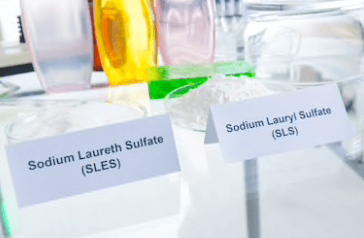
Shampoo’s that are meant to help with hair loss also have these Sulfates. Studies show that Sodium Lauryl Sulfate damages the hair follicle, if that happens there is a good chance it will contribute to hair loss, not aid it!
What is more surprising is how high up you will find this in the ingredients of these shampoos (top six) which point’s to a high percentage of Sulfate.
A bottle of shampoo that contains only 0.5% of concentrated chemical that has sulfates in it can irritate your skin. You can find some shampoos that have alarmingly high concentrations of compounds with sulfates, between 10 and 30% so you can see the potential that has to irritate your skin.
Sulfates are great for cleaning oily, greasy buildup; however when used on a long-term basis they also remove essential oils from your hair, these naturally producing oils are what nourish your body and hair, without these your hair becomes dry and brittle with nasty split ends.
Also, for people who suffer from oily hair and scalp, it can exacerbate the problem as the dryness may promote more secretion of oil.
Alternatives to Sulfates:
So, isn’t it time to start looking for Sulfate-free shampoos? Yes, its true they still contain surfactants, but they are usually milder and have minimal irritation to skin, such as decyl glucose, coco glucoside, and lauryl glucoside. However, Sulfosuccinates are suitable for body washes and shampoos with high oil content (up to 50%) they are effective cleansers that produce high foam but are considered a gentler sulfate. Most people are happy with these ingredients, although these may still cause minor irritation to people who have overly sensitive skin.
 What you need to look for are shampoos that contain 100% natural and organic ingredients. As with most organic products there are many benefits from them, along with fewer chemicals on your body, your hair is going to feel softer and cleaner with this type of shampoo, and your skin is certainly going to appreciate it.
What you need to look for are shampoos that contain 100% natural and organic ingredients. As with most organic products there are many benefits from them, along with fewer chemicals on your body, your hair is going to feel softer and cleaner with this type of shampoo, and your skin is certainly going to appreciate it.
Yes, sulfate free shampoo is going to cost a little more but isn’t it a price worth paying for the relief you are going to give to your hair and scalp?
A very good example of this is Moroccanoil Moisture Repair Shampoo, it is Sulfate-free, phosphate-free and paraben-free.
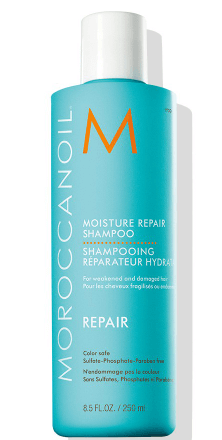 MOISTURE REPAIR SHAMPOO REVIEW
MOISTURE REPAIR SHAMPOO REVIEW
Vitamins and Supplements for Hair:
Hair growth supplements come in the form of vitamins or herbal supplements that are used to improve hair density and healthy hair growth and regrowth.
In both men and women, hair loss is the result of a mixture of genetic and hormonal circumstances. It can also be due to side effects from medication-steroids, illness or medical treatment such as chemotherapy, long periods of stress that not only affects your hair but can have damaging consequences to your overall health, also auto-immune disorders and thyroid problems can all lead to your hair suffering.
If you believe your hair loss is a result of health-related issues, you should consult your doctor, treat the medical condition and see if this resolves your hair problems.
Hair loss can be due to a poor diet or a nutritional deficiency, and in these circumstances, hair growth supplements may help. A good, well-balanced diet will also help with your overall health.
Although there are many vitamins, plant extracts, and herbal supplements to help healthy hair growth, these can only promote hair growth if you lack in vitamins or nutrients.
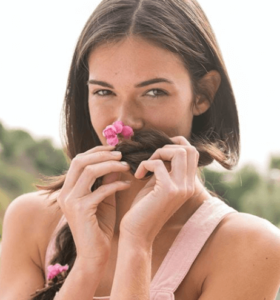
Supplements or vitamins to help hair growth:
- Iron
- Vitamin A, B, D, and E
- Zinc
- Amino Acids
- Omega Acids – especially omega-3 fatty acids.
Iron – This is essential for hair growth. If your iron levels are low (anaemia), less iron is supplied to hair follicles, this disrupts your hair growth cycle and result in hair loss for some people. You can increase your iron count by taking supplements or by adding these foods to your diet – red meat, fish, lentils, spinach, green vegetables.
Vitamin A – This is needed by the body to produce an oil known as sebum; this helps to keep the scalp conditioned and healthy. If we don’t provide enough sebum, the scalp can become irritated or itchy, and lead to your hair becoming dry and brittle. A pre-stage of ‘Vitamin A’ can be found in orange or yellow vegetables such as carrots or pumpkins.
Vitamin C – An antioxidant that assists the body to absorb iron and helps with the production of collagen. Good sources of Vitamin C can be found in blueberries, kiwis, oranges, and sweet potato.
Vitamin D – This is a vitamin that can help to reduce stress and depression and will be found in healthy hair follicles. Vitamin D is vital to healthy cell reproduction, which is why it is so important for hair growth. It can be found in oily fish, eggs, and mushrooms.
Vitamin E – This is an important supplement that will protect hair and skin from sun damage. Nuts, broccoli, avocados are a great source of vitamin E.
Zinc – This helps to regulate the level of DHT (dihydrotestosterone) in the body, this hormone is known to cause hair loss. If your zinc levels are low, your body will produce more DHT, so leading to hair loss. You can find zinc in sesame seeds, fish, eggs, and nuts.
Amino acids – Are thought to be necessary for hair growth because they help the body to produce keratin and grow hair. Amino acids can be found in protein-rich foods like dairy products, meat, and eggs.
Omega acids – such as omega-3, are essential fats that your body does not produce. Omega-3 acids provide essential oils that help to keep your scalp both healthy and hydrated. These oils can be found in oily fish, avocado, and pumpkin seeds.
It important that you only take the recommended daily dose of these vitamins or nutrients, if you take too much of something it can be as detrimental to your hair and skin as taking too little of something.
Nourkrin:
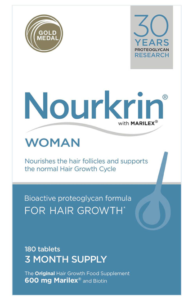
Nourkrin is a supplement that nourishes the hair and helps to aid the normal hair growth cycle. It contains nutritional supplement marilex which is fish extract and Biotin. Nourkrin should be taken regularly for a minimum period of at least six months.
As Nourkrin contains fish extract, it is not suitable for anyone allergic to fish or shellfish. You should avoid taking Nourkrin if you are breastfeeding or pregnant.
What is Biotin, does it help your hair to grow?
Biotin is a water-soluble B-vitamin and is also known as vitamin H, and it is recommended for strengthening hair and nails.
Biotin is a vitamin found typically in fish and works to break down certain fats and carbohydrates in the body. Biotin is often used in supplements for hair loss and brittle nails, particularly by pregnant women.
If you do not get sufficient Biotin in your diet, your hair may become weak and brittle, and this can lead to hair loss. You can prevent this by taking biotin supplements or by eating plenty of biotin-rich foods such as whole grains, liver, yeast, nuts and seeds, and salmon. Egg yolks are another biotin-rich food with one whole cooked egg providing up to 10mcg.
Do Supplements work?
Unless you are diagnosed with a severe deficiency in a specific vitamin, mineral or nutrient, you are unlikely to see overwhelming hair growth or regrowth, but the appearance of your hair should look stronger and healthier.
However, it is imperative to maintain a healthy and balanced diet. You should still make sure you are eating well and getting your recommended daily vitamin and nutrient intake.
How to care for your hair:
Women who have changed their hair washing routines, say it is because they are worried about damage to their hair as the main reason for change, so how often should you be shampooing?
Hair experts argue that less is more.
Over-washing can be hurting your hair, especially if you have bleached, colored, or chemically treated hair or it is naturally very dry or porous. Washing your hair every day strips away the natural oils and proteins that you require to keep your hair and scalp healthy, so do try to limit hair washing to three or four times a week. However, this can depend on your hair type.
Does hair get used to the same shampoo?
No, hair doesn’t get used to shampoo, it’s more a case that your hair requirements might have changed over time. If your hair has been colored or treated, you might now need a different formula, and if your hair becomes oily, try swapping to a lighter shampoo and also look for lifestyle reasons as to why it has changed.
I think it’s probably true that we need to rotate our shampoo to get the best performance from it, but the real reason is more likely to be because the products are building up on our hair and affecting it, alternating your shampoo on a regular basis can prevent this from happening.
How often should I wash my hair?
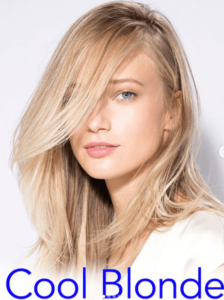
The finer and straighter your hair is, you will probably notice the faster your hair becomes oily. If you have this delicate type of hair, you will find that you can’t go more than two days without washing it.
The curlier your hair, the longer it allows you to go between washes, If you have thick, coarse, curly hair, this type of hair tends to be less oily, so you don’t need to wash it so often.
If you like to color your hair regularly, then it’s probably best to avoid washing your hair every day, this will stop your color from fading and your strands from becoming dry.
It is advised to leave your hair for at least 72 hours after a color has been applied before washing it, as it takes up to three days for the hair cuticle to close and trapping in the color molecules. So, If you wash your hair too soon, you risk disrupting the freshly applied color and your gorgeous new tone is likely to fade.
To help maintain your hair color, shampoo your hair with a color-protecting formula and wash using warm water, followed by a suitable conditioner, rinse out your conditioner with cold water. The warm water helps expand the hair cuticle, which allows the color-protecting agents to get in, and when you rinse with cool water, it snaps the cuticle shut and keeps the color inside.
When you do wash your hair, as we have stated, avoid shampoos that contain sulfates and silicons. Sulfates can strip the color, while silicons leave behind a residue that can have your new color looking dull.
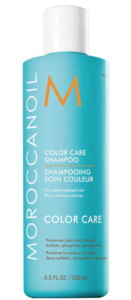 MOROCCANOIL COLOR CARE SHAMPOO REVIEW
MOROCCANOIL COLOR CARE SHAMPOO REVIEW
Dry shampoo is your friend:
If you are prone to getting greasy hair, then use a little dry shampoo in between washes to soak up excess oil. However, try to avoid becoming too reliant on dry shampoo, as overusing it can lead to build-up on the scalp, this in turn will lead to clogged hair follicles, which can hinder hair growth.
Protect your hair:
Hair can be damaged by both UV light and heated tools, like straighteners, tongs, and the ever-reliable hairdryer! So, it’s vital to protect your hair when styling it.
When you blow dry your hair at home, always use a heat protector to condition your hair from the inside out to shield against damage from any heated accessories.
Also, when drying your hair, be careful not to hold the hairdryer too close to your precious locks, this will help prevent nasty split ends. Never leave your hair dryer on your hair any longer than you could keep it on your skin.
Always think of your hair like you would your skin – what you put on it is going to affect it. Investing in good quality products and accessories will keep hair looking and feeling healthy and robust.
Is blow-drying bad for your hair?
Toweling your hair dry is akin to scratching your skin with your nails as it roughens up your hair fibers and air-drying can lead to frizziness.
Pat wet hair with a towel before blow-drying, if done correctly, it is better than toweling dry or just letting your hair dry naturally.
When blow-drying, the consistent heat applied in the same direction smoothens hair cuticles and gives your hair a nice shiny appearance. It also sets hair in place and helps seal in moisture.
To combat damage from hair styling accessories try using Moroccanoil Heat Styling Protection. This creates a thermal protective shield that allows hair withstand extreme heat, and provides a soft glossy finish to extend the life of every style.
Condition the right way:
A good conditioner is crucial when it comes to any hair type, at least once a month you should consider Deep Conditioning; this involves using a good quality conditioner that will put moisture and strength (protein) back into your hair.
To enable your hair to absorb the conditioner, towel-dry your hair after shampooing. Excess water will mean the conditioner will run off the hair and won’t penetrate the hair, delivering the necessary moisture to keep hair looking healthy and shiny. If you are short on time, at least squeeze out excess water before applying conditioner.
You apply the deep conditioner that is suitable for your hair type, beginning about halfway down your hair, moving towards the tips, always pay particular attention to the tips as these always seem to be drier than the rest of your hair. You can use a wide-toothed comb to ensure you spread the conditioner evenly.
Deep conditioning treatments usually require between 10 and 30 minutes on your hair, but they do vary in time so check with the product you have bought. You may now want to cover your head with a plastic shower cap; this is for two reasons.
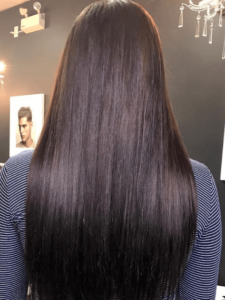
One it helps to keep the conditioner in place, and the second being that some deep conditioners recommend applying heat to your hair; the cap helps to keep the heat on your hair allowing the conditioner to do its job. You do this by using your hair dryer on a LOW setting to thoroughly heat the product, taking extra care not to have the temperature too hot as you do not want to melt the plastic cap!
Rinse your hair with cool water; this will tighten the hair shaft and help your hair look shiny and well conditioned. Leave a couple of days before washing to allow the treatment to properly nourish your hair.
Brushes Combs and Styling:
No-one wants a matted and unruly head of hair, so brushing is a necessity, but don’t tear through your locks mindlessly, being too aggressive will only cause damage to your delicate strands.
Brushing from the roots pulls your hair out and inflict damage – always brush from the bottom and work up gradually, especially suitable if you have long hair.
For shiny, healthy and untangled hair, you should be brushing your hair twice a day, in the morning and just before going to bed, for about a minute each time.
So what’s the best technique?
It would be best if you had a round brush for blow-drying, a brush for styling and a tail comb to divide and move hair around.
Good brushes can be more expensive but they are worth investing in, and if you look after them they will last a lifetime.
For your own personal hygiene and to keep your brushes clean and free of dead hair, oil, and product build-up wash them at least once a month in a mixture of baking soda and warm water.
Also, the brushes and combs you use should change when your hair is wet to avoid breaking and static build-up.
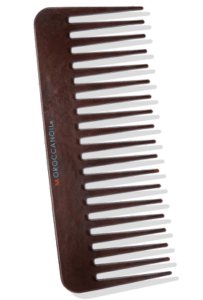 Detangling Comb: Wide teeth are perfect for combing through wet.
Detangling Comb: Wide teeth are perfect for combing through wet.
When your hair is very wet, it can be harder to comb through, but it is weaker, fragile and more susceptible to breakage. It is best to put your brush aside and use a wide-tooth comb. The teeth are designed to slide through wet hair – especially if coarse, wavy or curly – much more comfortable than a brush can, and there’ll be much less damage to contend with when it’s dry.
Women’s Hair Care:
If you have fine hair:
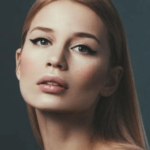
People with fine hair should be careful when putting anything on it containing oils like coconut, or olive oil, these are great for hydrating but can be too much if you have fine hair as the added weight will make it heavy, flat and limp. Aloe oil is an excellent alternative as it is lighter and will nourish without leaving hair looking or feeling greasy.
If you have thick hair:
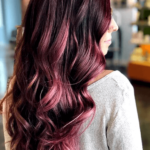
Thicker hair requires more hydration than fine textured hair due to wider strands. You need to be buying products that are moisture balancing to help hydrate drier ends and newer roots. If your hair is prone to frizzing, choose lightweight smoothing products that will control and not weigh your style down. If you do have very wavy or curly hair, a heavier cream or serum may be what you need.
African or Caribbean hair:
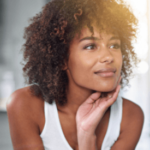
Afro and Caribbean hair can get dry because of its unique texture, which also makes it very fragile. It has distinct processing, styling and grooming needs and requires products that are specifically suited to it.
Most hairdressers comment that African-Caribbean hair is the most prone to damage of all hair textures. Issues they find with this type of hair are from product build-up on the scalp, and breakage caused by untangling the tightly-knit hair strands.
If you have coarse or curly hair:
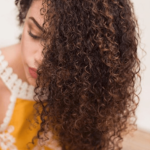
Coarse, curly hair will often get dehydrated as it’s harder for natural oils to travel down and coat the entire strand. Jojoba oil and Shea butter are perfect for coarse hair as they are similar to our natural hair oils. This type of hair can be challenging to style if over-washed and become frizzy, don’t be tempted to apply anything too silicone-heavy as it will dull your color and end up causing even more frizz.
If you have colored hair:
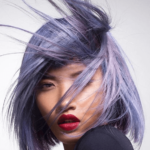
Those with colored hair should avoid shampoos containing sulfates and silicons as these will strip color and leave behind a residue that is going to make your new color look dull and flat.
Exfoliate your scalp:
People today are more than happy to exfoliate their face and fully appreciate the benefits gained from doing it, so why are they not giving any thoughts to scrubbing their scalp?
Dirt, oil, and product buildup form on your scalp just as it does on any other part of your skin, and to keep your scalp and your hair healthy, periodic exfoliation is necessary to unclog your pores.
Just like the pores on your face can get blocked, your hair follicles can become clogged due to sebum buildup. If you have ever felt tiny pimples when you touch your scalp, this could indicate that your hair follicles are clogged and may have become infected by bacteria.
Also, keeping your scalp clean of sebum buildup not only ensures healthy hair follicles and in turn a healthier head of hair but it will also promote hair growth.
You may be applying hair growth tonic to your scalp, but clogged hair follicles will mean that very little of the stimulant is penetrating that buildup of sebum to reach the intended hair roots. You’ll end up wasting your hair tonic, and money!
So, you may think using clarifying shampoos that are formulated to cleanse excess buildup will cleanse the scalp also, unfortunately, these shampoos are used to remove buildup on the hair, and these are not so good at deep cleaning the scalp. To remove prolonged sebum buildup on the scalp, you’ll need to use a scalp scrub or exfoliate.
DIY scalp exfoliate:
An excellent DIY scalp exfoliate that I make and use includes Sea salt and Coconut Oil – this is both detoxifying and purifying. Also, due to the sea salt, its drying properties help if you have oily hair.
How to prepare sea salt scalp scrub:
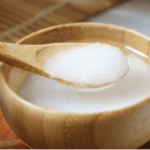
This DIY scalp scrub recipe is straightforward to follow. Put 3 to 4 tablespoons of sea salt (not table salt and certainly not rock salt) into a bowl and add coconut oil to it to make the mix slightly runny. Mix the oil and the sea salt for a few minutes, and there you have it, it’s ready!
To use, you first wet your hair, doing this will help to rub the solution into the scalp and also prevent any hair breakage.
Once you have wet your hair, gently rub the sea salt scrub onto your scalp in sections. Massage into your scalp without being too aggressive; you can add more water if the scrub becomes too dry. Massaging your scalp in this way also helps to promote better blood circulation and encourage hair growth.
Leave the solution on your scalp for a few minutes, rinse it off and shampoo. After exfoliating your scalp, this is a good time to apply your hair growth tonic. Your hair follicles are now clean and clear of any buildup and better able to absorb the nutrients.
Do this once a month will keep hair follicles clear, and your scalp will look and feel better, you may also see some new hairs appearing.
Conclusion:
I do hope this has brought to your attention just how important it is to be extra cautious when buying women’s hair care products. Buying chemical free products will make caring for your hair and skin so much easier, and a lot more rewarding.
Also, be aware that your overall health can have a telling effect on the appearance of your hair. Maintain a good healthy diet and add the correct vitamins and supplements will have a dramatic impact on the condition of your hair.
Allow for a little ‘hair time’ once in a while, having hair that looks shiny, full and healthy does wonders for your self-confidence.
What are your concerns regarding hair products and chemicals, do you use only organic products? Please leave any comments or questions below, and I will be happy to discuss them with you.
jo@yourskincarehelp.com
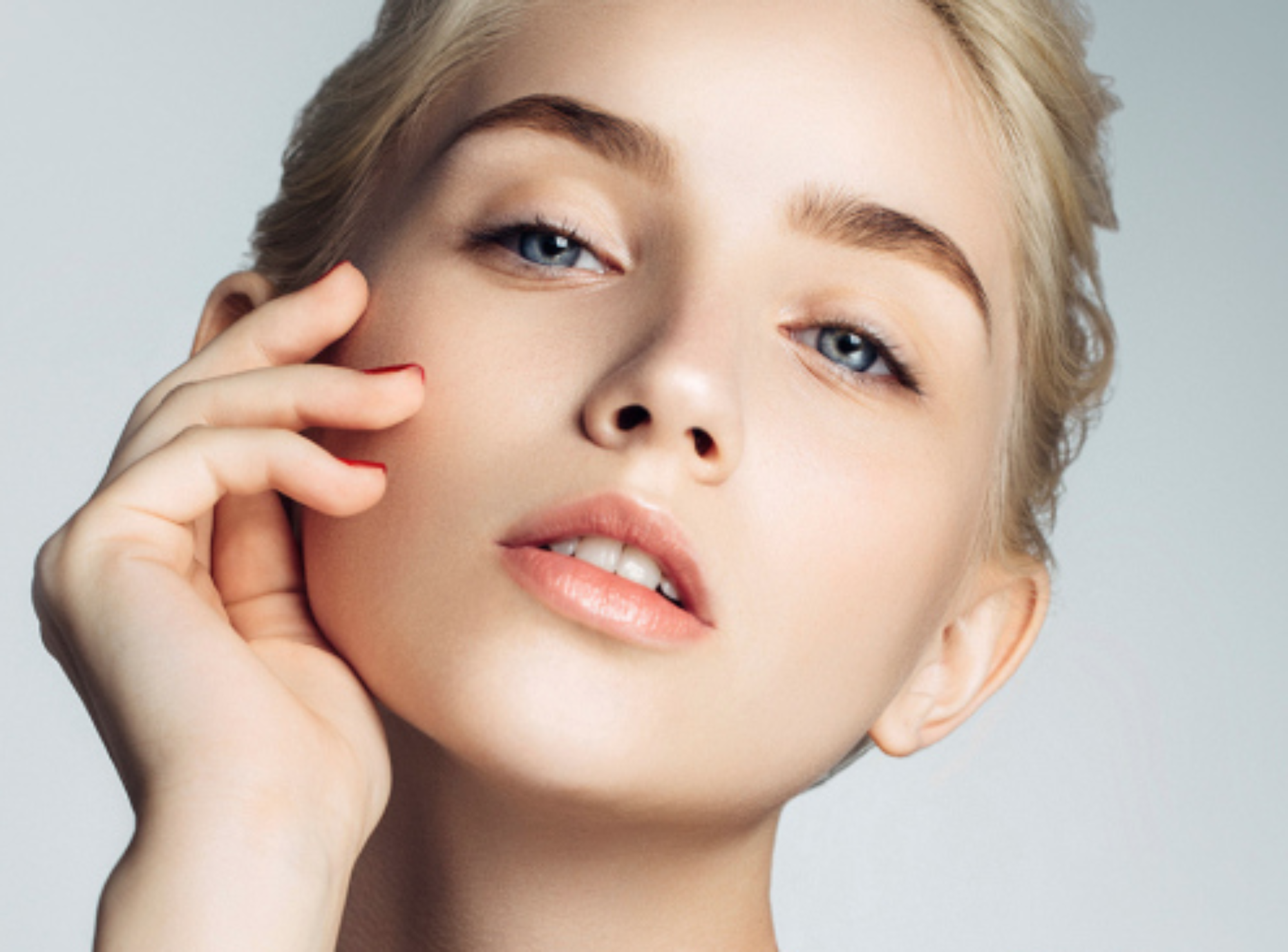

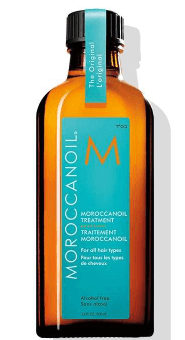
This has been a very interesting and educational article, as i have thinning hair, I wasn’t aware the effect the chemicals in the shampoos i use have on my hair! They certainly have not been helping my situation, and I will be taking steps to read the ingredients in the shampoo I buy next. Thank you for the added advice about the types of food and vitamins that may help towards healthier hair. Looking forward to reading your next post.
Hi Judy, I hear the same comment from so many people regarding how much chemicals is in so many products, be they hygiene products, food or just the air we breath.
Some things we can’t control or change, but of the things we can I would advise anyone to become more aware of what is going on around them and starting with shampoo and hygiene products is a big step forward.
Regards
Jo
Hi, I never new there is so many harmful chemicals in shampoo and hair products, this article has been a total eye opener, and makes me realise that I have to be much more careful when purchasing my hair products in future! This is very interesting, I will be sharing the information with my friends, many thanks Nikki ?
The Moroccanoil shampoo and treatment sounds like just what my hair needs as it has been thinning, and dull over last few months. I’m pleased there is one for colour treated hair also. I have heard some very good reviews about Moroccanoil hair products and maybe it’s time to give them and try and see what they can do for me. Fingers crossed!
Hello, you have given expert advice in your post. I know one of my biggest problems I create for my hair is to continuously have hi-lites and colours applied. I can feel how much damage it does to my hair but still find it difficult to stop doing it, crazy right! .. I’m interested to try this Moroccanoil color shampoo to see if that helps, or, at least keeps the color in a bit longer and avoid having so many visits to the hair salon. 🙂
Winter really plays havoc with my hair .. I find the Morrocanoil Treatment perfect to get me through these hair raising months!!
Hi, I go swimming a lot at my local leisure centre and enjoy a good workout at the Gym, so my hair and skin takes a bashing with the Chlorine and sweat!! But reading this article about Morrcocanoil Shampoo/products I decided to give them a try. I have found they help keep my scalp and hair too stay in good condition and I have recommended them to fellow fitness friends.